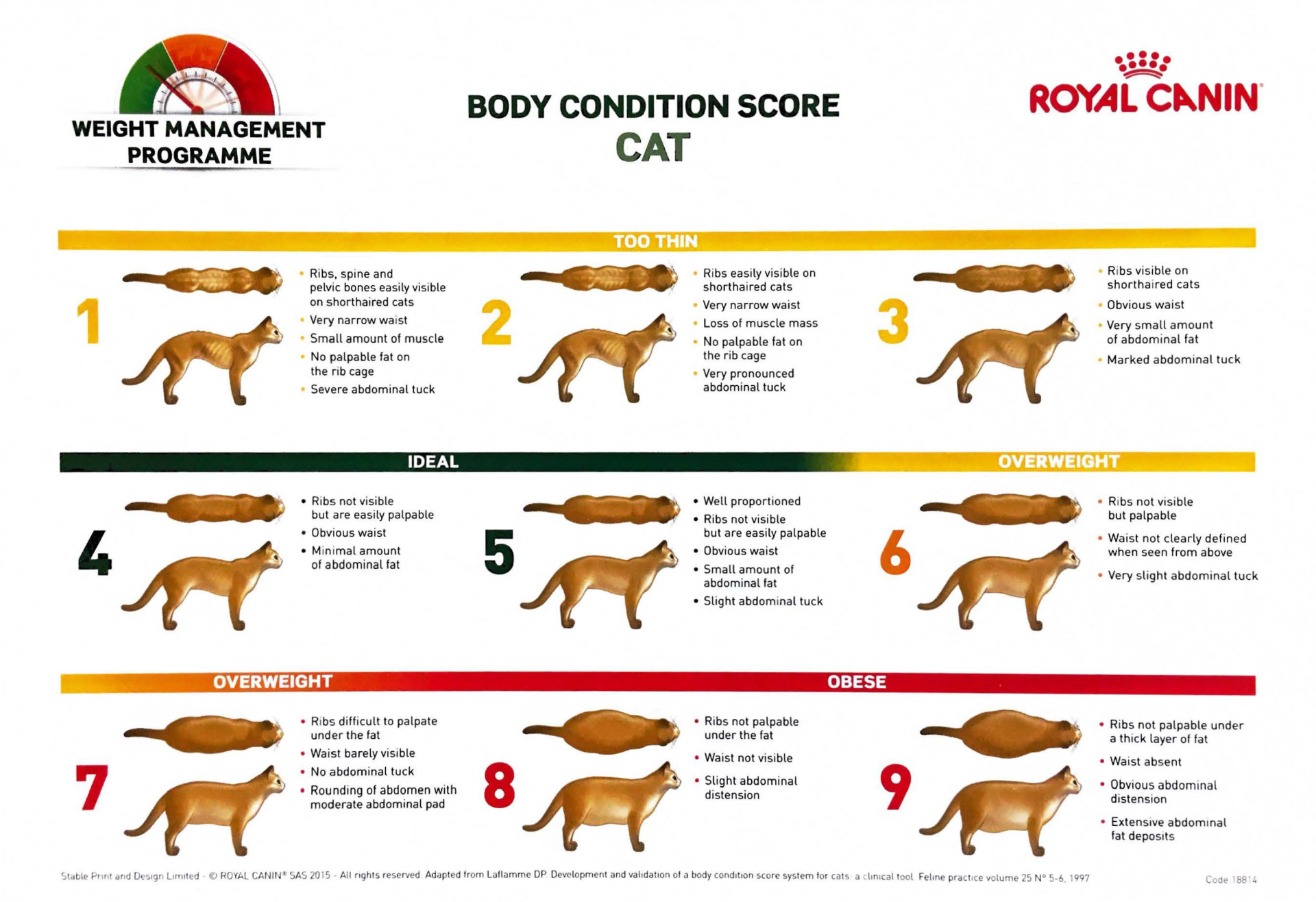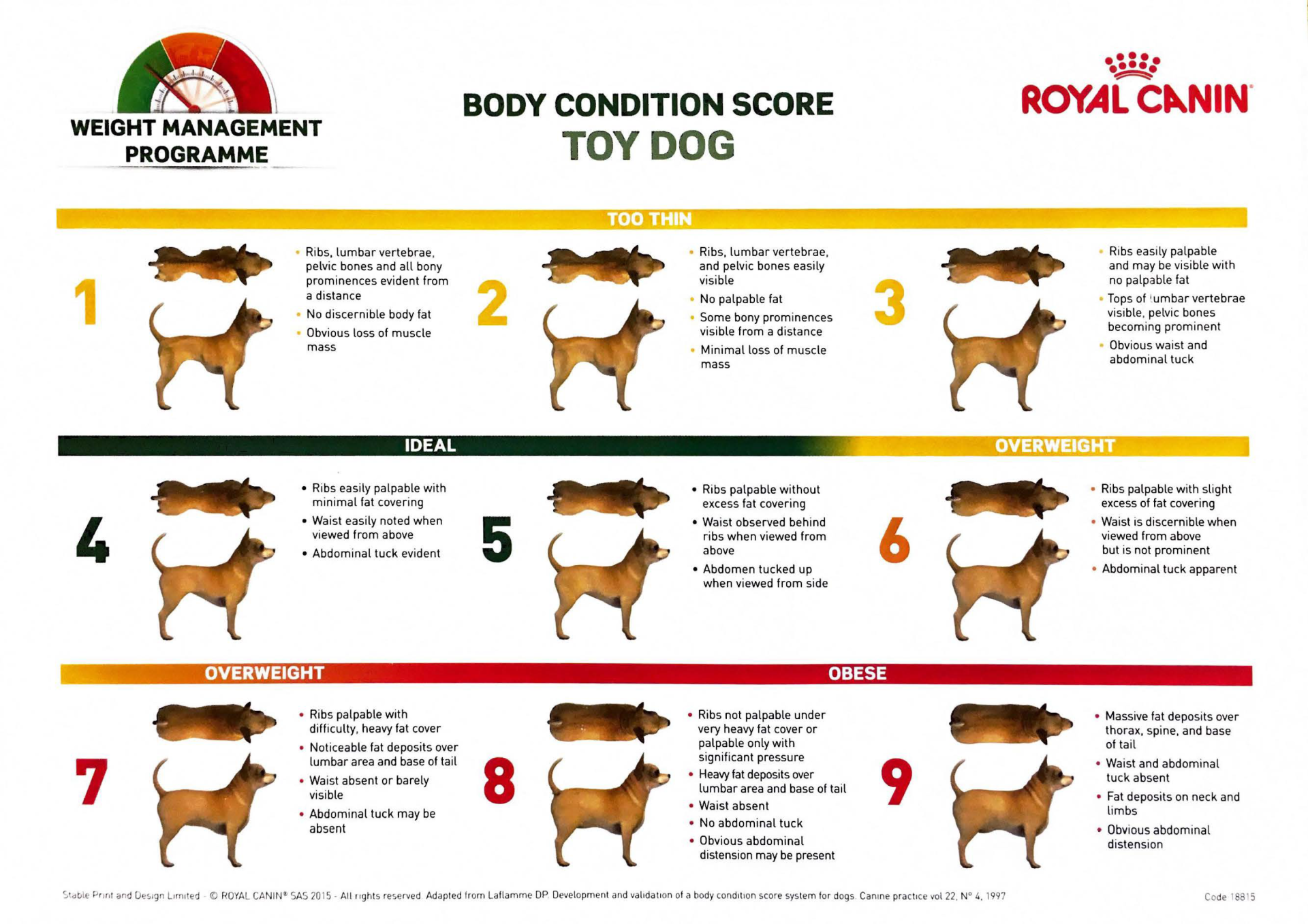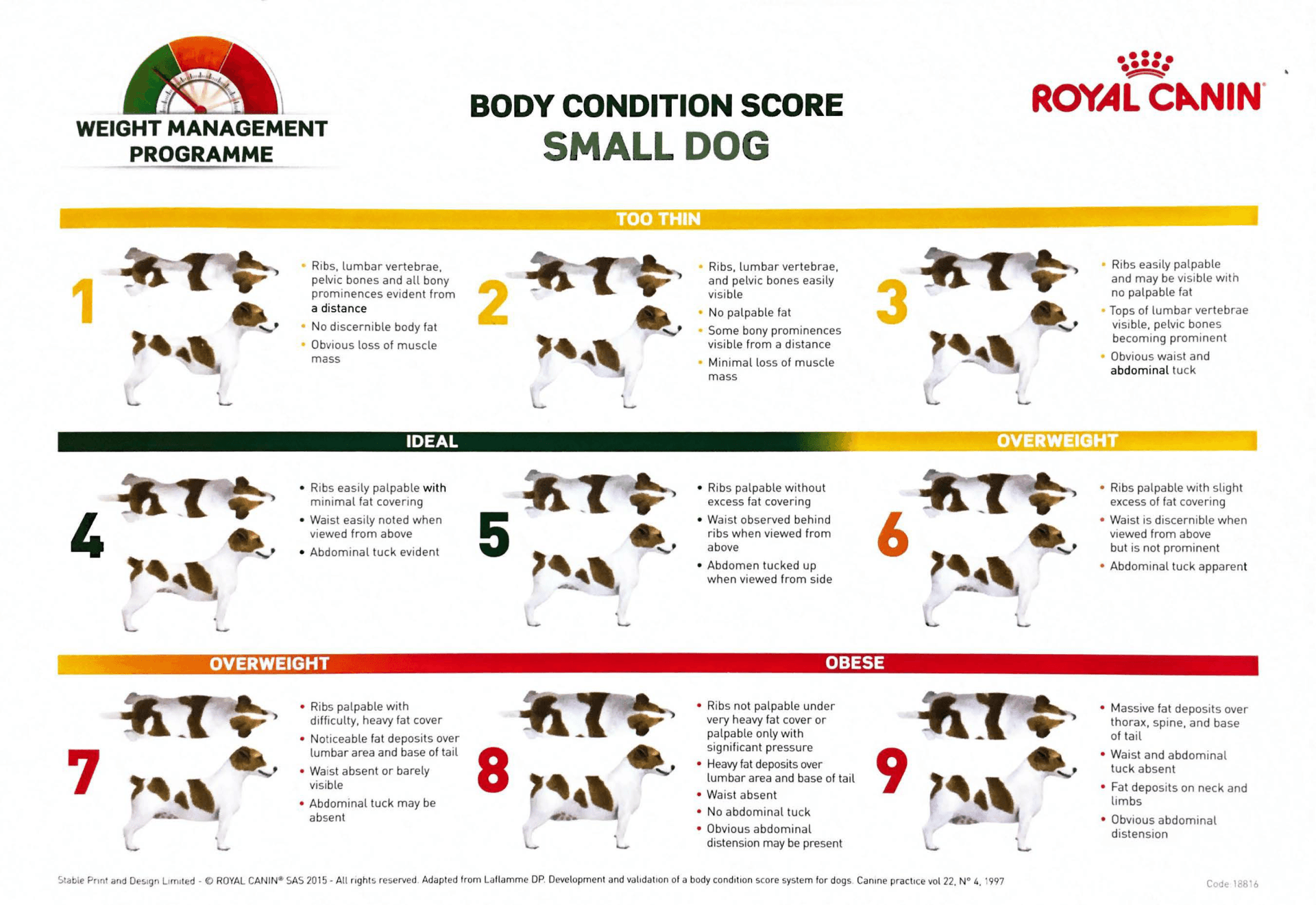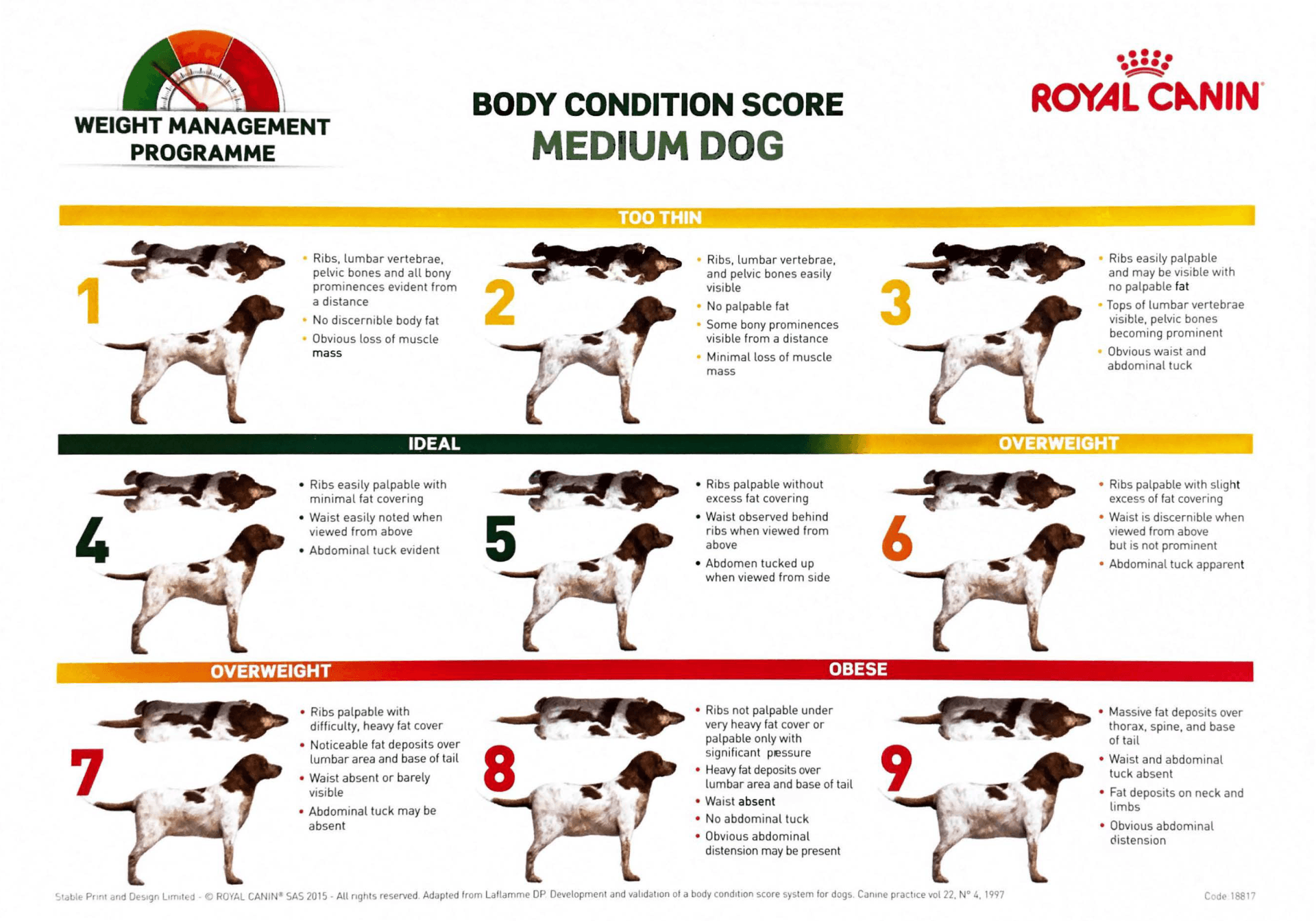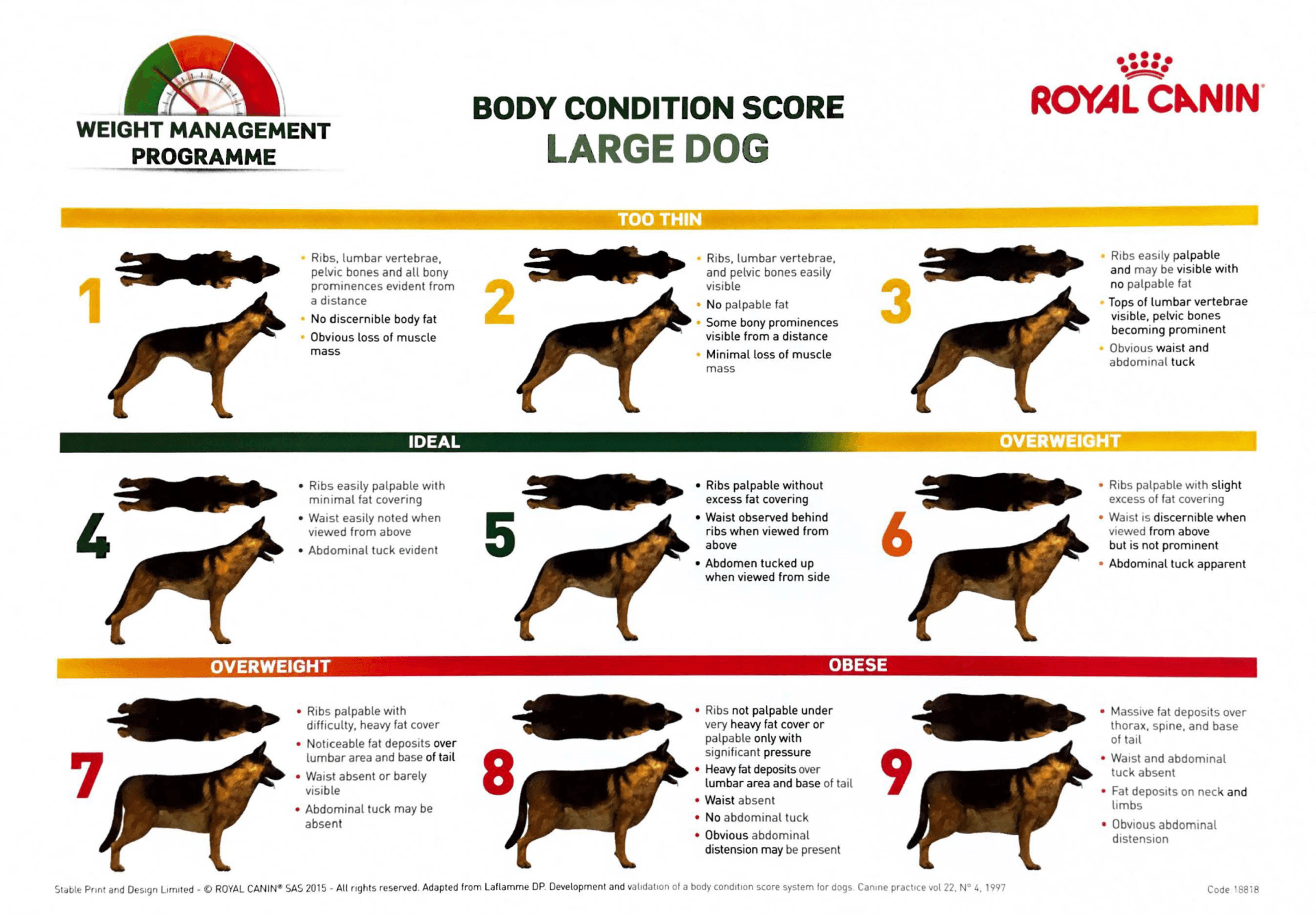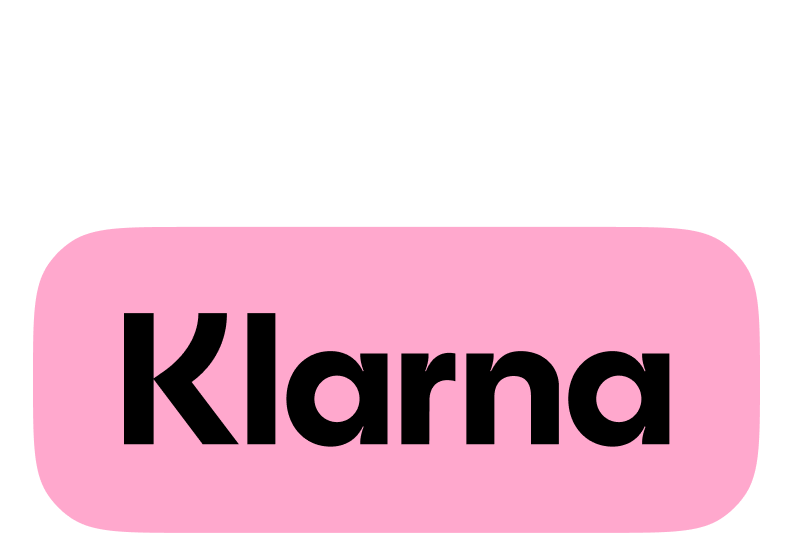WEIGHT MANAGEMENT
With over 50% of the animals coming in to see us classed as overweight/obese, here is some help...
Body Score/Condition Charts for Dogs and Cats
It is firstly , really important that you try and establish if your pet is the correct weight, or if they are overweight (or obese!) You can use the charts on the slider below to try and score your pet. The 1-9 scale is universal amongst vets (a bit like BMI score for people).
What is obesity?
Obesity is a condition whereby a pet has an increased amount of body fat, causing a significant detriment in current or future health. An animal becomes technically “obese” only once a period of unmanaged excessive weight gain has occurred.
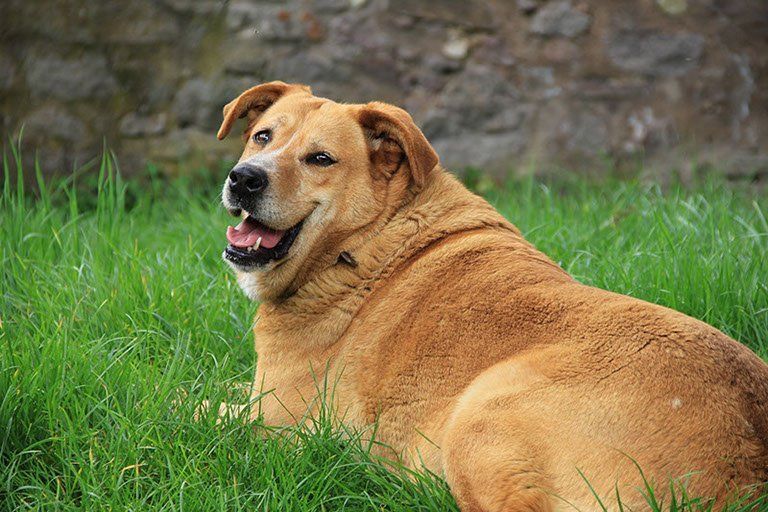
Is my pet obese or just overweight?
Just like humans, looking purely at weight alone is meaningless in dogs and cats due to massive variation with the species. The breed, size, shape and gender of pets all need to be factored in to the equation as well as the basic weight.
You can gauge for yourself the body condition of your pet. At the top of this guide there are links to charts that you can use to assess your pet. If your pet is in the “too heavy” bracket, then something needs to be done. Don’t wait for things to go too far!
Difficult as it may be to accept, but we as owners, are ultimately responsible for our pet’s lifestyle. Both dogs (particularly) and sometimes cats will usually eat pretty much whatever they are given. There is a bit of a myth that pets will “self-limit” what they eat and only eat what they require! This does sometimes occur, but ultimately most pets are greedy!!
Just like humans, looking purely at weight alone is meaningless in dogs and cats due to massive variation with the species. The breed, size, shape and gender of pets all need to be factored in to the equation as well as the basic weight.
You can gauge for yourself the body condition of your pet. At the top of this guide there are links to charts that you can use to assess your pet. If your pet is in the “too heavy” bracket, then something needs to be done. Don’t wait for things to go too far!
Why is my pet overweight or obese?
There are some medical conditions that can make your pet put weight on (eg hypothyroidism, Cushing’s disease) but in the majority of situations, obesity is due to lifestyle. Factors to look at include:
- Basic feeding regime
- Tit-bits, snacks, scraps and treats
- Exercise amount and frequency
- Age and breed of pet
- Whether neutered or not
- Alternative feeding habits, eg hunting in cats or being fed additionally elsewhere.
Difficult as it may be to accept, but we as owners, are ultimately responsible for our pet’s lifestyle. Both dogs (particularly) and sometimes cats will usually eat pretty much whatever they are given. There is a bit of a myth that pets will “self-limit” what they eat and only eat what they require! This does sometimes occur, but ultimately most pets are greedy!!
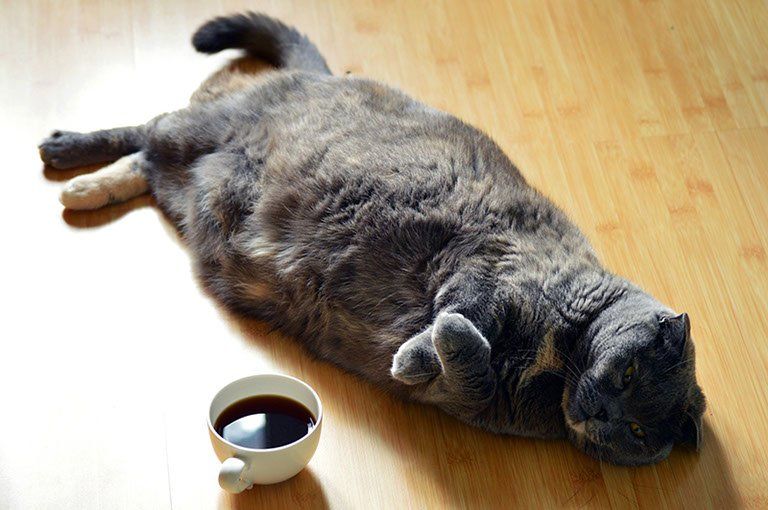
What the consequences of my pet being obese?
Recent studies have shown that obese pets have a significantly reduced life expectancy – often several or more years in dogs. Also, with overweight pets, the following problems are more commonly encountered:
What can I do if my pet is overweight or obese?
The first thing to do is accept that your pet is overweight – this is often the hardest thing to do. In a lot of instances, because you see your pet every day, it is common to assume that the current “shape” and “size” is normal. We are also seeing an increase in the idea that certain breeds are “normal” if overweight. If you are in any doubt, one of our vets or nurses will be able to advise you. Weight issues are one of the more common problems picked up at the pet’s annual check-over and vaccination examination.
What we will do initially is tell you your pet’s current weight and then estimate what your pet’s target weight should be. This is only the start; we will never just tell you to go home and make your pet lose weight! We have a number of services available to help you and advise you. These include:
Recent studies have shown that obese pets have a significantly reduced life expectancy – often several or more years in dogs. Also, with overweight pets, the following problems are more commonly encountered:
- Joint disease and arthritis
- Anaesthetic/Surgical complications
- Diabetes
- Certain types of infections
- Heart disease
- Certain types of cancer
- Breathing difficulties
- Decreased energy/mobility
The first thing to do is accept that your pet is overweight – this is often the hardest thing to do. In a lot of instances, because you see your pet every day, it is common to assume that the current “shape” and “size” is normal. We are also seeing an increase in the idea that certain breeds are “normal” if overweight. If you are in any doubt, one of our vets or nurses will be able to advise you. Weight issues are one of the more common problems picked up at the pet’s annual check-over and vaccination examination.
What we will do initially is tell you your pet’s current weight and then estimate what your pet’s target weight should be. This is only the start; we will never just tell you to go home and make your pet lose weight! We have a number of services available to help you and advise you. These include:
- Plenty of experience and advice to help you help your pet
- Walk on weighing scales – accurate to within 100g
- Specialised cat and rabbit weighing scales
- FREE nurse clinics to facilitate regular weight checks
- The latest computer software to help calculate a controlled and safe weight loss regime
- If necessary, specialised diets aimed to promote controlled and safe weight loss
- Your own personalised weight loss chart to help track progress
“Since my dog lost 15kg I am amazed at the difference. I thought he was just getting old, but now he is like a puppy again and many of his health issues have resolved. I really wish I had done something about it earlier”
What tips have you got to help my pet lose weight?
As mentioned before, weight problems are very rarely a simple case of feeding too much food at meal times. Therefore we need to concentrate on the whole day, rather than just meal times.
EXERCISE TIPS
As mentioned before, weight problems are very rarely a simple case of feeding too much food at meal times. Therefore we need to concentrate on the whole day, rather than just meal times.
FEEDING TIPS
- Feed a Senior/Light brand food. This type of diet usually has fewer calories per mouthful than normal food. This may not be suitable for young animals, or pets with existing medical conditions, so check with a vet before starting on this diet.
- Know an accurate weight for your pet so you will be able to calculate what amount of food you need to feed.
- Read the feeding guide on the pet food, and weigh out the correct amount of food that you should be feeding. Find some way of being able to consistently measure out the same amount of food – e.g. a plastic cup with a mark drawn on the side. Each morning measure out the daily requirement and then make sure you don’t feed any more. Keep the container and food separate so you aren’t tempted to just “scoop and go!” Be aware that the feeding guides on most diets are notoriously generous with their amounts. We would suggest you usually start about 10% below the lowest amount they estimate for your pet's breed/size.
- With plastic feed cups, actually cut off anything above the correct amount – this reduces the risk of you “topping-up” what the pet should be having.
- Feed smaller amounts, but spread throughout the day.
- Avoid commercial treats. Although they may seem harmless, the effects add up. Ideally use vegetables as treats – carrots are excellent and most dogs will like them. If you have to use manufactured treats, break them into small pieces - remember the pet is appreciating the gesture of the treat, not the size.
EXERCISE TIPS
- Any exercise is better than no exercise. With dogs, take them out to the shop with you or even just walk around the block. Exercise stimulates metabolism and even a short walk will be highly beneficial – and they will love it too!
- With younger dogs, try and encourage them to run. Chasing toys and balls (not sticks!) are always useful.
- With older dogs, running may not be always a good thing to do. Perhaps try shorter walks but more often. Three 5 minute walks is usually better than one 15 minute walk.
- Cats are harder to exercise – try letting them out more if you live in a quiet area as cats have a tendency to exercise themselves quite well. This is obviously a little more risky if you live near a big main road, or there are lots of other cats around to get into fights with.
- Encourage cats to chase and play. Using bits of paper or toys on strings are great for stimulating play. Laser pointers are excellent fun with cats!
- Hide food around the house to encourage hunting behaviour in house cats.
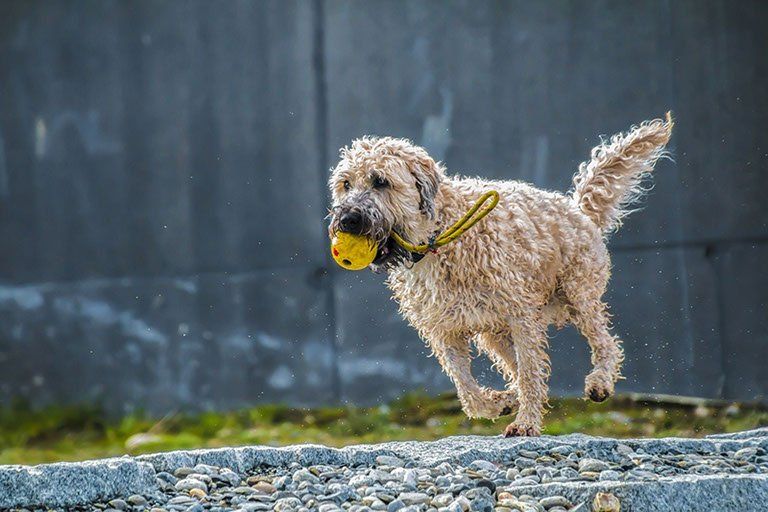
“If you are feeding a certain amount of food and treats/titbits and your pet ISN’T losing weight, then this amount (however small you think it actually is) is going to be TOO MUCH and needs to be reduced.”
What will happen if I start the surgery’s weight clinics?
Once we have identified you pets is overweight and you are keen to get a weight loss regime started we will get you started on the Weight Clinics.
These weight clinics and the advice given by the nurses are FREE OF CHARGE!!
Once we have identified you pets is overweight and you are keen to get a weight loss regime started we will get you started on the Weight Clinics.
- Full nurse consultation to discuss and plan a suitable diet and weight loss program.
- Regular weight checks every 2-4 weeks to check progress.
- If specialised diet foods are being used, we will be able to tell you exactly how much food you need to be giving – to the nearest gram!
- A chart documenting the weight loss will be produced – this is essential to ensure that your pet loses weight at a safe and controlled rate.
- Follow up weight checks to ensure that the weight doesn’t creep back on again.
These weight clinics and the advice given by the nurses are FREE OF CHARGE!!
“Our aim of the weight clinics is to devise a plan that suits both the pet AND the owner.
If your pet doesn’t lose weight we will discuss further actions or plans to ensure that he/she does. ”
If your pet doesn’t lose weight we will discuss further actions or plans to ensure that he/she does. ”
